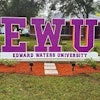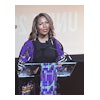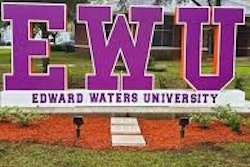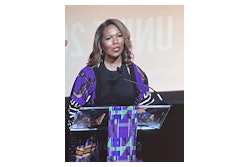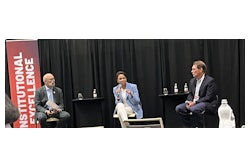UNCF Examines Digital Divide On Campus
by Ronald Roach
Nearly a month before the federal government’s July release of Falling Through the Net: Defining the Digital Divide — a report that details the disparities of computer ownership and Internet usage among Americans along racial, ethnic, and income lines (see Net Report Stirs Concern, next page) — The College Fund/UNCF convened its member presidents and technology administrators to examine the digital divide existing between private, historically Black colleges and universities, and their traditionally White peer institutions.
Earlier this summer in New Orleans, the association hosted its first ever “Technology Summit” to give representatives from its 39 member institutions an opportunity to discuss and explore ways to improve information technology use and resources at each of the campuses.
The summit attracted more than 100 UNCF school technology administrators and college presidents for the day-long meeting — which included keynote presentations from Dr. Dorothy Yancy, president, Johnson C. Smith University; Dr. Sylvester Oliver, chief information officer, Rust College; Dr. Roberto Bamberger, manager, faculty and professional development initiatives, Microsoft Corp.; and Lt. Gen. Albert Edmonds, chief operating officer, EDS government industry group. Representatives from technology companies, such as the Microsoft Corp. and Dell Computer Corp., also attended the summit.
“For 55 years, we have been the preeminent higher education fund for African American people,” says William Gray, chief executive officer of The College Fund/UNCF.
The basis for hosting the summit was to provide school officials “training and seminars on what’s available in information technology,” according to Gray.
“[We] want to teach them how to fish better,” he says.
Gray pushed for the summit after having discussions with Bill Gates, Microsoft Corporation chairman, in April, according to UNCF officials. Information technology (IT) represents one of several program areas for which UNCF coordinates technical assistance for its member schools.
One of the summit highlights was the release of preliminary findings from a comprehensive information technology survey documenting IT resources and use at UNCF campuses. The survey showed that only 34 percent of students at UNCF schools were using the Internet compared to 78 percent of students at all private four-year U.S. colleges. Among faculty, only 12 percent of UNCF institution instructors used the Internet, in contrast to 90.6 percent of faculty at all private four-year schools. The survey also revealed that at a 76 percent rate, faculty members at UNCF schools lag behind faculty at all four-year private colleges, which have a 91 percent rate of access to an assigned computer.
Survey findings, however, did indicate that 18 UNCF institutions had high usage of technologies, such as online registration, automated libraries, online courses, and distance learning. The survey also reported that 100 percent of UNCF schools have formal faculty training and local area networking capabilities, and most have computer access in libraries, computer centers, classrooms, and dormitories.
“There seems to be a digital divide between UNCF schools and other private colleges,” says Dr. Sylvester Oliver, chief information officer at Rust College in Mississippi.
Oliver, who consulted with UNCF on the survey and presented the findings at the summit, says the survey spanned 39 pages and was undertaken by UNCF this past spring. “We got an opportunity to look at the hardware and software profile of the [UNCF schools],” Oliver says.
Steven L. Pruitt, executive vice-president of UNCF for operations, explains that survey results will serve as the basis for an information technology action plan that UNCF is developing for its member institutions. UNCF expects to seek assistance from major technology companies based on the plan the organization develops, according to Pruitt.
“The survey is bringing folks together to focus on a strategy and a game plan for a funding request,” Pruitt says. “What we’re assessing are [the schools’] technology needs.”
Pruitt adds that UNCF officials working with consultants are currently analyzing the survey data, and will eventually publish and distribute the results.
In her presentation, Johnson C. Smith University’s president, Dr. Dorothy Yancy, demonstrated how, with committed leadership and centralized planning, a school with meager resources can attain an advanced IT infrastructure and wide IT use in the curriculum. JCSU students and faculty will be the first from any HBCU to participate in IBM’s Thinkpad University program. Under the program, which is to be launched next spring, every student and faculty at JCSU will have an IBM laptop computer for educational use. The campus will have 2,000 ports in dormitories and classrooms where students can plug in their laptops and access the school’s computer network and the Internet (see Black Issues, May 13, 1999).
Yancy says that with students and faculty having instant access to the campus network virtually anywhere on campus, JCSU will be able to convert some of its computer labs into electronic classrooms.
The Thinkpad program, which is in place at numerous campuses around the country, requires a school to have a sophisticated campus computer network, widespread use of computers and Internet in the curriculum, and a faculty trained extensively in using computers as a teaching tool.
Yancy credits participation in the program with helping JCSU to become more advanced in using IT as a campuswide teaching and learning tool than many other schools.
“Our program is not hardware-driven; it’s driven by academics,” Yancy says. “We had developed a model for the academic program that incorporated technology. The [IBM program] provided additional pieces for the model.”
Yancy says many schools struggle to get beyond a point where the computers are not solely used for administration and handed out only to students and faculty in computer science and engineering programs. Progressing beyond those limited uses of IT demands that an institution devote considerable resources to training faculty, developing a campuswide computer network, and providing adequate computer facilities for students, she says.
Joe Macklin, director of information technology at Saint Paul’s College in Virginia, says he appreciates the UNCF leadership for organizing the summit and conducting the survey. One of the values of a summit meeting, he says, is that you can learn from others about the experiences they have encountered while upgrading campus IT infrastructures.
“You get an idea of where the Black colleges are on the technology spectrum, and ways you can improve facilities at your own school,” Macklin says.
© Copyright 2005 by DiverseEducation.com


